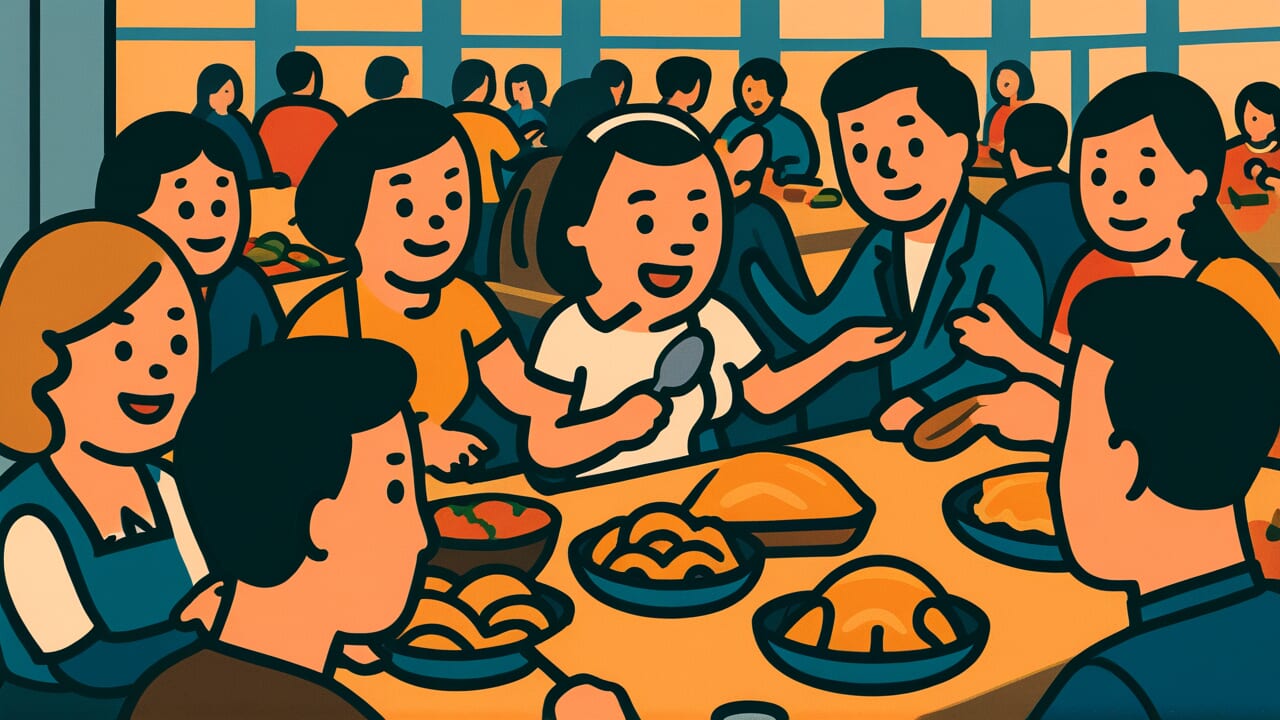How to Read “For work, many people; for tasty things, few people”
Shigoto wa ōzei umai mono wa kozei
Meaning of “For work, many people; for tasty things, few people”
This proverb contrasts two truths about human society.
When you work, having many people helps you finish efficiently. But when you eat delicious food, having fewer people means everyone gets a bigger portion.
The first half shows the advantage of cooperation. Difficult tasks and heavy labor become easier when more people help. Each person’s burden gets lighter, and the work moves faster.
The second half shows the reality of sharing benefits. When you divide limited delicious food, fewer people means more for each person. This reflects what everyone honestly feels.
People use this proverb to point out the contrast between needing cooperation and dividing rewards, usually with humor.
It captures a human contradiction. We want help when things are hard, but we want to keep rewards for ourselves when things go well.
The proverb doesn’t criticize this feeling. Instead, it accepts it as natural and shows tolerance for human nature.
Even today, this wisdom applies. We want many people for projects, but fewer people to share the bonus with.
Origin and Etymology
The exact first written record of this proverb is unclear. However, it likely came from the everyday experiences of common people during the Edo period.
The structure places two contrasting situations side by side. “For work, many people” and “for tasty things, few people.”
The first half reflects a time when many tasks required manual labor. Rice planting, construction, and carrying cargo all needed many hands.
When many people worked together, they could carry heavy objects. They could finish planting a wide rice field quickly. Real experience showed that cooperation reduced individual burden and dramatically increased efficiency.
The second half, “for tasty things, few people,” reveals honest human feelings.
When many people share delicious food, each person gets less. This isn’t just about material calculation. It also includes the joy and satisfaction of savoring a treat.
By placing these two ideas together, the proverb expresses a fundamental contradiction in human society with humor.
Work and reward, cooperation and profit. We need help when working, but we prefer fewer people when gaining benefits.
The proverb captures these honest human feelings as common wisdom.
Usage Examples
- For the school festival, it was “for work, many people; for tasty things, few people.” We all worked together on preparations, but maybe fewer people would have been better for sharing the pizza at the party.
- Moving help is “for work, many people; for tasty things, few people,” so I invited many friends. But preparing thank-you cake for everyone was tough.
Universal Wisdom
This proverb has been passed down because it perfectly captures two conflicting desires in the human heart.
We are social creatures. When facing difficulties, we can overcome challenges together that we couldn’t handle alone.
Humanity has known this joy and security since ancient times. Hunting, farming, building houses—none of these work without cooperation.
That’s why “for work, many people” represents a basic principle of human society.
But at the same time, we are individuals. We want to protect our own interests and gain as much reward as possible.
This isn’t shameful. It’s a natural feeling rooted in survival instinct.
That’s why “for tasty things, few people” speaks to honest feelings everyone has deep down.
The deep wisdom of this proverb lies in presenting both conflicting truths without denying either one.
Cooperation is necessary. Individual benefit matters too. By acknowledging both, it teaches us about the complexity of human relationships and the difficulty of balancing social life.
No one is perfect. Living with contradictions is what makes us human. This proverb shows a profound understanding of human nature.
When AI Hears This
When you view work and eating as energy flows, a surprising asymmetry emerges.
According to the second law of thermodynamics, maintaining order requires constant energy input.
Left alone, rooms get messy, buildings decay, and organizations fall into disorder. This is the law of increasing entropy.
Work is precisely the act of resisting this natural flow. Advancing projects, maintaining quality, keeping customers satisfied—all these activities push back against states that want to become disordered.
That’s why many hands are needed. Order that ten people can barely maintain cannot possibly be supported by two people.
On the other hand, eating delicious food simply means receiving a “low-entropy state” that a cook has already created.
In other words, you’re on the receiving end of energy someone else invested. In this case, more people means less per person, and satisfaction decreases.
With fewer people, you can efficiently enjoy the invested energy.
This proverb captures a universal principle through experience. The optimal number of people is opposite depending on whether you’re investing energy or enjoying its fruits.
Creating order costs energy, but when that fruit is distributed, its value thins out. This is remarkably physics-based wisdom.
Lessons for Today
This proverb teaches modern people the importance of honesty and flexibility in human relationships.
When you start a project, actively gather teammates for difficult tasks. Asking for cooperation isn’t weakness—it’s wisdom.
When many hands gather, you can achieve goals that seemed impossible.
At the same time, when distributing profits and results, be conscious of fairness based on contribution.
Not everyone may have worked equally hard. This proverb helps us think about how to balance these realities.
Most importantly, this proverb allows us to be honest with ourselves. Wanting to cooperate but also wanting to gain, wanting to help but not wanting to lose—having these contradictory feelings is completely normal as a human being.
Acknowledging these honest feelings and then choosing how to act—that’s the wisdom of a mature adult.
Don’t aim to be a perfect saint. Instead, build relationships where people can still cooperate despite having desires and weaknesses.
That’s the warm message of this proverb.



Comments